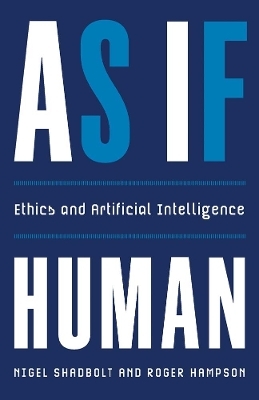
As if human
Ethics and Artificial Intelligence
Seiten
2024
|
1. Auflage
Yale University Press (Verlag)
978-0-300-26829-4 (ISBN)
Yale University Press (Verlag)
978-0-300-26829-4 (ISBN)
A new approach to the challenges surrounding artificial intelligence that argues for assessing AI actions as if they came from a human being
Intelligent machines present us every day with urgent ethical challenges. Is the facial recognition software used by an agency fair? When algorithms determine questions of justice, finance, health, and defense, are the decisions proportionate, equitable, transparent, and accountable? How do we harness this extraordinary technology to empower rather than oppress?
Despite increasingly sophisticated programming, artificial intelligences share none of our essential human characteristics—sentience, physical sensation, emotional responsiveness, versatile general intelligence. However, Nigel Shadbolt and Roger Hampson argue, if we assess AI decisions, products, and calls for action as if they came from a human being, we can avert a disastrous and amoral future. The authors go beyond the headlines about rampant robots to apply established moral principles in shaping our AI future. Their new framework constitutes a how-to for building a more ethical machine intelligence.
Intelligent machines present us every day with urgent ethical challenges. Is the facial recognition software used by an agency fair? When algorithms determine questions of justice, finance, health, and defense, are the decisions proportionate, equitable, transparent, and accountable? How do we harness this extraordinary technology to empower rather than oppress?
Despite increasingly sophisticated programming, artificial intelligences share none of our essential human characteristics—sentience, physical sensation, emotional responsiveness, versatile general intelligence. However, Nigel Shadbolt and Roger Hampson argue, if we assess AI decisions, products, and calls for action as if they came from a human being, we can avert a disastrous and amoral future. The authors go beyond the headlines about rampant robots to apply established moral principles in shaping our AI future. Their new framework constitutes a how-to for building a more ethical machine intelligence.
Nigel Shadbolt is principal of Jesus College, Oxford, and professor in the Department of Computer Science at the University of Oxford. He lives in Lymington, UK. Roger Hampson is an academic and public servant and former chief executive of the London Borough of Redbridge. He lives in London, UK.
| Erscheinungsdatum | 05.04.2024 |
|---|---|
| Verlagsort | [New Haven] |
| Sprache | englisch |
| Maße | 140 x 216 mm |
| Einbandart | gebunden |
| Themenwelt | Geisteswissenschaften ► Philosophie ► Ethik |
| Informatik ► Theorie / Studium ► Künstliche Intelligenz / Robotik | |
| Recht / Steuern ► Privatrecht / Bürgerliches Recht ► IT-Recht | |
| Sozialwissenschaften ► Soziologie | |
| ISBN-10 | 0-300-26829-7 / 0300268297 |
| ISBN-13 | 978-0-300-26829-4 / 9780300268294 |
| Zustand | Neuware |
| Informationen gemäß Produktsicherheitsverordnung (GPSR) | |
| Haben Sie eine Frage zum Produkt? |
Mehr entdecken
aus dem Bereich
aus dem Bereich
Buch | Softcover (2024)
REDLINE (Verlag)
CHF 27,95
die materielle Wahrheit hinter den neuen Datenimperien
Buch | Hardcover (2024)
C.H.Beck (Verlag)
CHF 44,75


